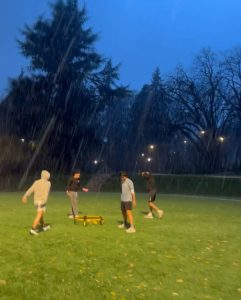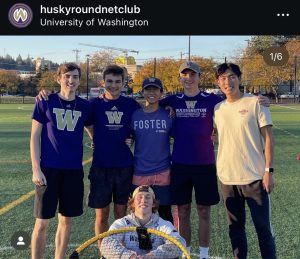Spikeball: It’s More than a Sport at the University of Washington
Sanda Thang
The spikeball community at the University of Washington embodies the essence of a thick institution, where shared ideals and activities bring students together, fostering a sense of belonging – backing up Brook’s statement in his article How to Leave a Mark on People. In addition, according to the National Resource Council in Community and Quality of Life: Data Needs for Informed Decision Making, “character of a place, its identity, and its people’s sense of rootedness are shaped by interactions within the place and with others.” This is evident in how spikeball unites students from diverse backgrounds, creating a strong, interconnected community to embody the characteristic of a thick institution and emphasizing the importance of people and place.
Ben, an active freshman, reflects on his experience: “playing spikeball has enriched my college experience by helping me meet new people and expand my community in ways I wouldn’t have otherwise.” This highlights the importance of place and people in his college life. Initially drawn to the sport due to its competitive nature and similarities to volleyball, basketball, and soccer, Ben found himself increasingly engaged with the weekly pickup games with the Roundnet Club on campus. Over time, these interactions fostered friendships and a profound sense of belonging within the spikeball club.

Similarly, another member of the Roundnet Club, emphasizes the communal aspect of the sport. “I love competing, and going down to Oregon with the club has been the highlight,” he shares. For this student, spikeball is not just about the competition but also about building lasting friendships. The shared passion for the game unites players, forming a tight-knit community that extends beyond the campus.

For another UW player at the University of Washington, spikeball is a casual and inclusive activity that enhances his social life. “It’s something my friends and I can always do on a nice day,” he explains. The simplicity and accessibility of spikeball make it a perfect sport for spontaneous gatherings, reinforcing its role as a community-building tool. The ease of setting up a game and the ability to include multiple players ensure that everyone feels welcome.
As demonstrated by these students’ experiences, spikeball at the University of Washington serves as more than just a sport; it is a catalyst for community building and personal growth. The competitive yet inclusive nature of the game attracts students like Ben and the others, offering them a platform to connect, compete, and create lasting memories. Through the shared love for spikeball, students experience a deeper connection to their university and each other, illustrating the powerful impact of thick institutions and the importance of place in shaping their college experience.
Disclaimer
We used ChatGPT for grammar check and proofreading. Our story ideas are our own.
Reference
- Brooks, D. (2017, April 18). How to Leave a Mark on People. The New York Times. https://nyti.ms/2pwdTYz
- The Importance of Place and Connectedness | Community and Quality of Life: Data Needs for Informed Decision Making | The National Academies Press. (n.d.). https://nap.nationalacademies.org/read/10262/chapter/5
- huskyroundnetclub. (2022, November 14). PNW Fall College Sectional. Login • instagram. https://www.instagram.com/huskyroundnetclub/
Media Attributions
- figure1 © Ben Sudlow is licensed under a CC BY-NC-ND (Attribution NonCommercial NoDerivatives) license
- figure2 © huskyroundnetclub is licensed under a CC BY-NC (Attribution NonCommercial) license

